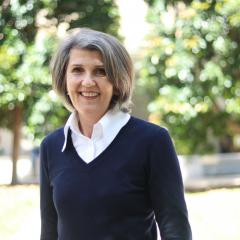Professor Nancy Pachana is a clinical psychologist, neuropsychologist and Professor at the School of Psychology. She is also the UQ Ageing Mind Initiative co-director. Her main research interests include anxiety in later life, early assessment of dementia and driving safety and dementia.
What does it mean to our community that people now have a longer lifespan than in previous generations?
Longer lifespans do not only translate into more years at the end of life – really they can be seen as an opportunity to rethink how we spend all of the years we are allotted. People may have time to pursue multiple careers, stagger their education over their working life and pursue meaningful work as well as leisure for longer. The availability of grandparents and even great-grandparents can offer assistance with childrearing across generations.
However, more creative ways to re-envision retirement, more along the lines of continuing engagement rather than disengagement, are required. If we were to realign our expectations towards affording older adults the opportunity to remain engaged, this would offer economic and social benefits to industry and younger workers, in terms of harnessing the experiences and knowledge of older generations. Maintaining engagement in meaningful activities, along with keeping physically, mentally and socially active, are key ways to maintain healthy ageing.
Why is the ageing population often viewed as a burden on society?
This often arises from a narrow focus on perceived medical and economic support for increasing numbers of older persons by a shrinking younger workforce and stretched healthcare system. The more balanced reality encompasses the continued contributions of older generations to civic, workplace, and family settings. Whether it is grandparents as part or full-time caretakers of grandchildren, older carers of persons in need, or older workers engaged in paid or voluntary work, older generations continue to contribute in socially and economically meaningfully ways.
Furthermore, recent research highlights global decreases in time spent in more severe disability in the later years of life – a product of improved health, technological and lifestyle interventions. Although threats to this scenario remain real – including issues around obesity and inactivity – in many ways the greatest challenge for societies such as Australia with increasing numbers of older adults is that they will miss opportunities to utilize this growing resource effectively.
What are the UQ Ageing Mind Initiative’s primary objectives?
The Ageing Mind Initiative, or AMI, is a virtual clinical ageing research group at UQ coordinated by myself from the School of Psychology in the Faculty of Health and Behavioural Sciences and Professor Gerard Byrne from Psychiatry in the Faculty of Medical and Biomedical Sciences.
Gerard and I hope that the informal and formal links between UQ researchers and clinicians with an interest in ageing can foster synergies and networking, strengthen investigator-driven research initiatives and partnerships, assist and mentor young investigators and facilitate linkages across disciplines and the wider community. We are currently engaged with our Faculties, colleagues and students in a number of strategic and research initiatives, including projects in aged care, clinical trials and the expanding use of our Geriatric Anxiety Inventory instrument in research on late-life anxiety.
As a Co-Director of the Ageing Mind Initiative what are your hopes for the future of Australia’s older adults?
I hope that my fellow Australians of all ages continue to think creatively about what added years of life could mean for how we live our lives.
We have solid data that show that actions taken today, whatever your age, can improve health and well being in later years. I’ve mentioned physical, mental and social activity, but how we engage with each other across generations is important as well.
Relying on stereotypes to approach ageing is harmful not only to older persons but to all members of society. Intergenerational contact helps young and old witness the many creative housing arrangements or shared work experiences that strengthen community ties and foster sharing of energy, assistance and ideas across generations.
Finally, I hope our students at UQ, in all disciplines, spanning research and applied practice and every blending in between, consider applying their talents to improve our ability to age with meaning and grace.
Words: Kirsten O'Leary
Photo: Anjanette Webb




